CLICK HERE for the latest market quotes from the Iowa Agribusiness Network!
CLICK HERE for the latest market quotes from the Brownfield Ag News Network!
CLICK HERE for the latest market quotes from the Iowa Agribusiness Network!
CLICK HERE for the latest market quotes from the Brownfield Ag News Network!
(Radio Iowa) – Rural fire departments have been kept busy responding to field fires the past couple of days — especially in northwest Iowa where six of the ten active burn bans are in place. That includes Woodbury County where a burn ban was enacted on February 20th. County emergency services director, Andrew Donawa, says some people have apparently forgotten about it. He says they’ve had a little snow and rain and people must think they are okay to burn brush. “That’s not the case, we’re still fighting this drought from all this dry weather.”
Donawa says they’ve had more than one dozen fire calls in Woodbury County alone the past two days. Other northwest Iowa counties with burn bans are Plymouth, Cherokee, Ida, Monona, and Crawford counties. Donawa says farmers need to be patient before burning away brush piles. “Just wait, we’ll let you know when the ban is lifted. And if you feel like you need to burn, you should probably call your local fire chief and double-check that the ban has been life. And if it is not lifted — make sure you’re not burning,” Donawa says.
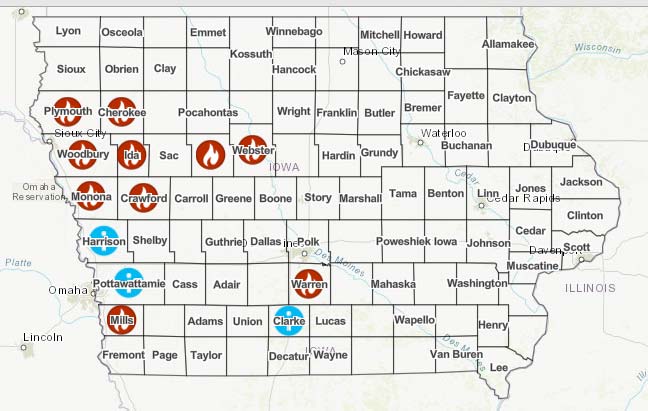
Counties marked in a red flame have an active burn ban in-place; Counties with a blue “I” are where burn bans were recently lifted.
He says if you ignore the ban, you are putting your property and nearby property at risk as well as violating the law. “The sheriff’s office will come out and most likely talk with you and they could possibly give you a ticket for burning under the burn ban,” Donawa says. “The burn bans come from the fire marshal’s office at the state and then the sheriff has the authority to enforce that as a ticket or a citation or a fine.”
Any violation of the burn ban declared by the state fire marshal is a simple misdemeanor with the violator subject to a fine and court costs. The State Fire Marshal’s website lists other burn bans in Mills, Webster, Warren, and Calhoun County.
(Radio Iowa) – A compromise plan to let all-terrain vehicles travel on more county and state highways has cleared the Iowa House. Representative Bobby Kaufmann of Wilton says new safety measures are incorporated in his original plan. “At the end of the day, it comes down to personal responsibility and there’s only so much the government can do for you as far as babysitting,” Kaufmann says.
If the bill becomes law, A-T-Vs driving on local highways would have to be equipped with headlights, tail lights, turn signals and mirrors, plus the drivers would have to be at least 18 and have liability insurance. City officials would be able to prohibit A-T-Vs from driving within city limits. Representative Christina Bohannan of Iowa City says the bill also sets a 35 mile an hour speed limit for A-T-Vs driving on county or state highways.
“I think there are a lot of things in here that do improve safety, including for the counties that currently allow this,” Bohannan says. “I’m not saying it’s perfect, but I do think it makes some improvement.” Existing county ordinances designating where A-T-Vs may travel on local highways would remain in effect, but county boards of supervisors would have to get a local A-T-V club’s sign off if any changes are made in the future. Representative Dennis Cohoon of Burlington says that’s a loss of local control.
“Over two-thirds of the counties already have an ordinance,” Cohoon says. “…If that’s up to negotiation with any group, I’m sure they would feel like that they’re losing their control over being able to determine which roads are best, which roads are safest in their given areas.” Cohoon says A-T-Vs aren’t meant to be driven on highways and he was one of 29 House members to vote against the bill. There were 64 yes votes, though, sending the bill to the Senate for review.
(Radio Iowa) – With gas prices rising, farmers are feeling the impact of inflation, as higher costs for fuel and fertilizer are shrinking profit margins for Iowa growers. Chad Hart, an agriculture economics professor at Iowa State University, says while commodity prices are good, rising fuel prices can significantly increase production expenses. “It’s not only the cost to run the tractor across the fields to plant and harvest the grain,” Hart says, “there’s a lot of fuel used to move our farm products down the supply chain line.”
Hart says farmers also face challenges with price volatility, as fluctuating prices are making it harder to know when to buy and sell. Kelly Garrett, a farmer from Denison, says his planter tractors use at least 100 gallons of diesel fuel every day. “It’s gone up $1.50 or $2 a gallon,” Garrett says, “so, there’s an extra couple hundred dollars a day to put your crop in just from a fuel standpoint.”
Garrett says higher fuel prices means he’s also paying more for shipping. In the past year, he says he’s seen his shipping costs double. Triple-A-Iowa says the statewide average for gas is $3.91 a gallon. That’s 11-cents below the all-time Iowa high of $4.02 set in July of 2008. The current national average is a record $4.32.
(Kendall Crawford, Iowa Public Radio)
(Massena, Iowa) – The Cass County Conservation Board is holding a Night Hike this Saturday night, near Massena. The Full Moon and Spring Equinox Night Hike will be held at the Outdoor Educational Classroom outside of Massena, on Saturday March 19th 2022, beginning at 8:30 PM.
Conservation officials invite you to “Come out for a great night hike. The spring equinox (vernal equinox) marks the astronomical first day of spring in the Northern Hemisphere. This hike will feature spring equinox facts, folklore, and more! FREE, Dress for the weather!”
DES MOINES – Today (Friday) Gov. Kim Reynolds announced the signing of a disaster proclamation for Taylor County in southwest Iowa effective immediately through April 9, 2022. The USDA has confirmed a positive case at a commercial layer chicken flock in Taylor County. Previously, the virus was detected in Pottawattamie and Buena Vista Counties, in Iowa. In Pott. County, the infected birds were in a back yard mixed-species (non-commercial) flock. In BV County, the virus was found in a commercial turkey operation.
The proclamation allows state resources from Iowa Homeland Security, the Iowa Department of Agriculture and Land Stewardship, and other agencies to assist with tracking and monitoring, rapid detection, containment, disposal, and disinfection. The proclamation also waives regulatory provisions related to commercial vehicles responding to affected sites.
The recent highly pathogenic avian influenza (HPAI) detections in birds do not present an immediate public health concern, and it remains safe to eat poultry products. If producers suspect signs of HPAI in their flocks, they should contact their veterinarian immediately.
About HPAI
HPAI is highly contagious, viral disease affecting bird populations. HPAI can travel in wild birds without those birds appearing sick, but is often fatal to domestic bird populations, including chickens and turkeys. The virus can spread through droppings or nasal discharge of an infected bird, which can contaminate dust and soil.
Signs of HPAI include:
For updates on this developing situation, please visit https://iowaagriculture.gov/animal-industry-bureau/avian-influenza.
(Radio Iowa) – The confirmation of highly pathogenic avian influenza in a commercial turkey flock in Buena Vista County has increased the anxiety among poultry producers. Morgan Minnehan is a spokesperson for the Iowa Turkey Federation. “It worries us it hurts our stomachs, you know our farmers provide good care for these birds and have the emotional connection with them,” Minnehan says. They remember the devastating bird flu outbreak in 2015 that led to the death of thousands of birds at a cost of one BILLION dollars. Minnehan says prevention measures have stepped up since that outbreak.
“We’re always doing those biosecurity efforts. When we have disease confirmation it’s just a heightened double-checking everything, making sure those biosecurity plans are being implemented times ten. What we learned from 2015 is the faster we get those birds euthanized the less animal suffering we have and the less chances for spreading the disease,” according to Minnehan. Migrating waterfowl bring the bird flu into the state and she says producers keep an eye on a migration tracking program. “It just kind of shows roughly how many birds are in migration during that time and those migration patterns, she explains. “So, always monitoring those and making sure that the line of separation is there on their farms to not bring disease into their barns if it is located outside.”
Minnehan says everyone can help prevent the spread of the bird flu by being aware of what to do. “If you come from a site where there are poultry — or you have a backyard flock yourself — just get familiar with those resources. Get your biosecurity plan implemented and just monitor where you can to just mitigate the spread and help all poultry producers in the state of Iowa,” she says. Minnehan says Iowa ranks seventh in turkey production and fifth in processing nationwide — as a majority of the turkeys are used for lunch meat and other turkey products. She reminds everyone that the bird flu doesn’t impact humans.
“High path A-I doesn’t put a health risk in anything that goes into the meat counter or into those deli meats and other processed items. It is safe for consumers to eat,” Minnehan says. “Our farmers on a regular basis — whether a High Path outbreak or not — are always testing and doing blood samples to ensure that a safe product will be in the stores.” Minnehan says turkey producers are limiting access to farms, washing truck tires, and doing intense cleaning and sanitization of equipment and work boots to try and prevent the spread of the disease.
(Radio Iowa) – The Iowa Senate has passed a bill to legalize the sale of raw milk at dairy farms. It still would be illegal to sell unpasteurized milk at restaurants and farmers markets if the bill becomes law, but raw milk and other products like cheese, yogurt and ice cream that are made with unpasteurized milk could be sold legally at the dairy where it’s processed. Senator Tony Bisignano, a Democrat from Des Moines, says the bill makes something legal that’s going on already.
“I don’t think in this state people ought to be criminalized for things that they choose to do that don’t harm someone else,” Bisignano said. Republican Senator Jason Schultz of Schleswig says the vast majority of states now allow raw milk sales. “If we do this, get it all the way through, there’ll be only five states left,” Schultz says. “…It’s not a political issue. This is just a (decision of): ‘Do we want to let the people who want this have access to it?” Raw milk enthusiasts say milk that hasn’t been pasteurized has more nutrients and tastes better.
Critics say raw milk contains dangerous bacteria. The Iowa Farm Bureau, the state’s diary industry and Iowa grocers oppose the bill. Senator Janet Petersen, a Democrat from Des Moines, says raw milk should have a warning label because pregnant women are at serious risk of becoming ill from Listeria if they consume it. “A warning label to prevent stillbirth, miscarriage, death of a newborn and illness of a pregnant mom I don’t believe is too much to ask,” Petersen says.
Senate Democratic Leader Zach Wahls says federal data shows at least 144 Americans had to be hospitalized between 1993 and 2012 after consuming raw milk. “This idea that there’s no connections to hospitalizations or outbreaks is simply not true,” Wahls says. Previous attempts to legalize raw milk sales in Iowa have stalled in the past two decades. The Senate bill on the subject passed on a 32-to-15 vote and goes to the House for review.
(Radio Iowa) – Iowa’s two U-S senators are introducing new legislation they say will bring an immediate lowering of gasoline prices while boosting biofuel production. Senator Joni Ernst says President Biden’s announcement Tuesday to ban Russian oil imports didn’t take advantage of the domestic fuel option, but instead Biden lauded the use of electric vehicles, a policy Ernst calls “reckless.”
“Energy security is national security,” Ernst says. “Banning Russian oil was long overdue but it’s unacceptable that this administration remains beholden to the radical, deranged climate agenda of the far left and still refuses to support America’s homegrown energy, like Iowa biofuel.” Ernst, a Republican, says the Homefront Energy Independence Act has bipartisan support and would put the ban on Russian oil into law while combining several other efforts from previous bills. Ernst says, “It would make E-15 available year-round, establish an E-15 and biodiesel tax credit, direct EPA to finalize their E-15 labeling rule, and provide for biofuel infrastructure and compatibility with retailers.”
Ernst says gasoline prices are at record high levels, topping four dollars a gallon in many states, and she says the solution is simple: backing biofuels. “Iowa’s clean, American-made renewable fuels are ready and available to meet our nation’s needs right away,” Ernst says. “In fact, the current excess ethanol capacity domestically is nearly the same as the amount of Russian gas the U.S. had been importing, roughly 83-million barrels versus 87-million barrels.”
Senator Chuck Grassley quotes Triple-A in saying gasoline prices nationally are averaging four-dollars and 17 cents a gallon, surpassing all-time records set in July of 2008. Grassley, a Republican, disagrees with the administration “begging OPEC to send us more oil” while releasing billions of gallons from the strategic petroleum reserve. “While the price of oil continues to go up, President Biden is off talking about electric vehicles,” Grassley says, “which require, can you imagine, rare earth minerals that come from where? Russia and China.”
Grassley says domestic biofuels provide the quick and easy answer the country needs by immediately slashing prices at the pump. “It’s a clean energy solution that can immediately lower gas prices and bolster American energy independence,” Grassley says, “and will result in a cleaner environment than importing dirty oil from Venezuela.”
Triple-A-Iowa shows gasoline prices are averaging $3.89 a gallon statewide, which is still shy of the Iowa record average of $4.02 set in July of 2008. In the past week, gas prices in Iowa have risen 46-cents a gallon on average, and they’ve risen 60-cents in the past month. A year ago, gas was averaging $2.76 in Iowa, a dollar-13 below the current price.
Breeding Peregrine Falcons (Falco peregrinus) disappeared from Iowa in the 1950s because of wide spread use of the pesticide DDT. Peregrine falcons historically nested on cliff ledges, but have also adapted to nest on human-made structures like tall buildings and bridges.
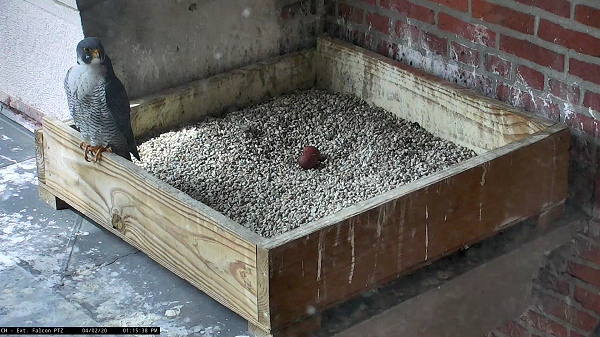
Two eggs sit in the shallow “scrape” that serve as nests for Peregrine Falcons
After DDT was banned in the U.S. in 1972, the Iowa DNR began a Peregrine Falcon restoration program in 1989 with 23 birds released in Cedar Rapids followed by another 19 released in Des Moines in 1991. Between 1989 and 2003, a total of 169 birds were released in Iowa feeding into a regional restoration effort that saw 875 birds released across the Midwest. In 1999, the first pair of birds nested on their historic nesting grounds along the Mississippi River bluffs. Most of Iowa’s current Peregrine Falcon nests occur in the eastern half of the state in three main environments: Urban, Mississippi River bluff faces and energy plant towers.
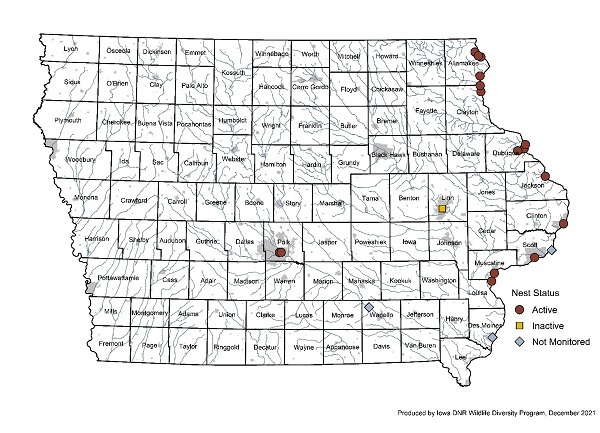
Each year, monitoring of nest sites is accomplished by a network of volunteer and professional surveyors. The Raptor Resource Project monitors and bands birds at a number of Peregrine nest sites in the Northeastern corner of the state. Several of the nest sites are on power plants which have restricted access so we rely on employees who not only monitor the nest sites but are often wonderful stewards for the birds. Surveyors collect data on the nest’s activity and whether the pair are successful in producing fledglings.
There were 20 known nest sites in 2021 which had recently been active or were suspected active. One new nesting site was established and three sites along the Mississippi River that were inactive in 2020 were active in 2021. Reports were received on 17 of the 20 sites (Table 1). Sixteen of the 17 monitored nests were active, one inactive. Of the 16 active nests, 5 failed to produce young and 11 were successful. A minimum total of 28 young were fledged from the 11 successful nests. An average of 1.75 young were produced at each nest with a known outcome.
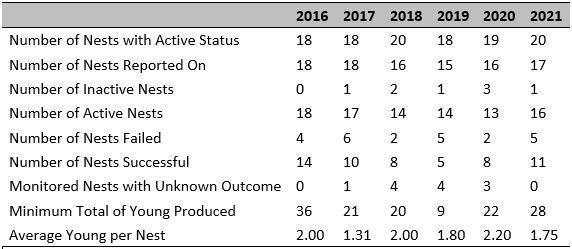
Comparing 2021 data to recent years indicates that 2021 was a good year for breeding Peregrines, with more active/recently active nest sites than in 2020 and the second highest percent of successful active nests (69%) since 2016 (Figure 2). A minimum of 28 Peregrine Falcons fledged in Iowa in 2021, the second highest number since 2016. Overall, Iowa’s nesting population of Peregrine Falcons appears to be stable, with birds generally returning to historic nesting sites each year, but this recovering population continues to warrant annual monitoring.
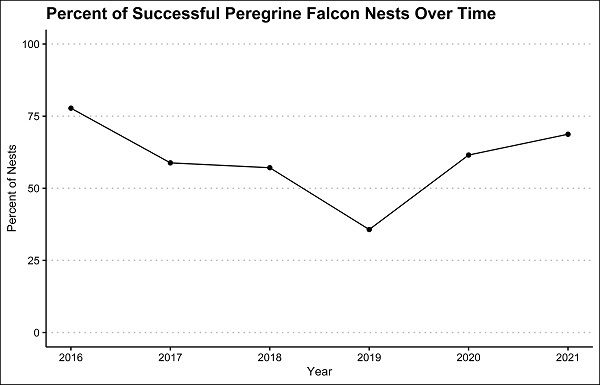
In future years, the DNR will continue to monitor Peregrine Falcon nest sites with the partnership of volunteers and others who care about falcons in Iowa. Falcon nest sites can be very challenging to monitor because of their location and the territoriality of the birds so any data received is much appreciated. Monitors are needed at nest sites in the Quad Cities and Burlington. Please contact the DNR’s Volunteer Wildlife Monitoring Program coordinator if you’d like to help, vwmp@dnr.iowa.gov.